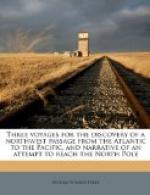A herd of musk-oxen being seen at a little distance from the ships, a party was despatched in pursuit; and Messrs. Fisher and Bushnan were fortunate in killing a fine bull, which separated from the rest of the herd, being too unwieldy to make such good way as the others. He was, however, by no means caught by our people in fair chase; for, though these animals run with a hobbling sort of canter, that makes them appear as if every now and then about to fall, yet the slowest of them can far outstrip a man. In this herd were two calves, much whiter than the rest, the older ones having only the white saddle. In the evening, Sergeant Martin succeeded in killing another bull; these two animals afforded a very welcome supply of fresh meat, the first giving us three hundred and sixty-nine, and the other three hundred and fifty-two pounds of beef, which was served in the same manner as before.[*]
[Footnote: The total quantity of game obtained for the use of the expedition during our stay upon the shores of Melville Island, being a period of nearly twelve months, was as follows: 3 musk oxen, 24 deer, 68 hares, 53 geese, 59 ducks, 144 ptarmigans: affording 3766 pounds of meat.]
It was gratifying to me to find that the officers unanimously agreed with me in opinion that any farther attempt to penetrate to the westward in our present parallel would be altogether fruitless, and attended with a considerable loss of time, which might be more usefully employed. They also agreed with me in thinking that the plan which I had adopted, of running back along the edge of the ice to the eastward, in order to look out for an opening that might lead us towards the American Continent, was in every respect the most advisable; and that, in the event of failing to find any such opening after a reasonable time spent in search, it would be expedient to return to England rather than risk the passing another winter in these seas, without the prospect of attaining any adequate object; namely, that of being able to start from an advanced station at the commencement of the following season.
At three P.M. we were abreast of Cape Hearne; and, as we opened the bay of the Hecla and Griper, the wind, as usual on this part of the coast, came directly out from the northward; but, as soon as we had stretched over to Bounty Cape, of which we were abreast at eight P.M., it drew once more along the land from the westward. The distance between the ice and the land increased as we proceeded, and at midnight the channel appeared to be four or five miles wide, as far as the darkness of the night would allow of our judging; for we could at this period scarcely see to read in the cabin at ten o’clock. The snow which fell during the day was observed, for the first time, to remain upon the land without dissolving; thus affording a proof of the temperature of the earth’s surface having again fallen below that of freezing, and giving notice of the near approach of another long and dreary winter.




